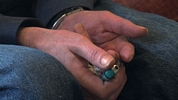When they were introduced years ago, tartar-control toothpastes caused a sensation in the market owing to their alleged ability to prevent gum disease. But the question remains: do these products realty work or are they just an advertising gimmick?
First of all, what is tartar? This chalky, hard substance which your dentist calls calculus is a product of minerals in your saliva and plaque - a sticky material that clings to the surface of the teeth. As plaque accumulates, it hardens to form tartar which irritates the gums and can make you susceptible to periodontal disease.
"Tartar is calcified plaque, made rock hard by the minerals in saliva. If the plaque isn't removed by flossing and brushing, it can start to harden in 24 to 36 hours," said Consumer Reports.
Tartar-control toothpastes normally contain pyrophosphate and zinc citrate which can reduce tartar by as much as 50 percent. However, there is no evidence that the use of such products will actually prevent gum disease or tooth decay.
The reason: most of the harmful effects of tartar occur below the gum line which cannot be reached by brushing with antitartar toothpastes. Only a dentist can scrape off these hard deposits which mean that there is no substitute for regular dental care.
"Much advertising is being done these days for tartar-control toothpastes. These toothpastes have been found to decrease the accumulation of tartar on the teeth above the gum but have little or no effect on tartar below the gum line. Unfortunately, it is the tartar below the gum line that can lead to periodontitis, the gum disease that can result in loss of teeth. Tartar-control toothpastes may have a cosmetic effect and make your teeth easier to clean when you see the dentist, but they are of little use in keeping the really harmful tartar from building up," said Dr. David E. Larson, editor-in-chief of the “Mayo Clinic Family Health Book.”
"The American Dental Association endorsement found on some brands of tartar-control toothpaste refers not to the antitartar qualities but to the fluoride the toothpastes contain," he added.
Aside from being ineffective, antitartar toothpastes may also make your teeth more sensitive to cold. The active ingredients of some brands may leave your mouth red and irritated. This was reported by the Journal of the American Academy of Dermatology which said that a rash appeared in a group of women being treated for dental problems at a Baltimore hospital. This was later traced to the irritating effect of their tartar-control toothpastes.
"Compounds of pyrophosphate, the active ingredients in tartar-control toothpastes, are the source of the trouble: either alone or with saliva, they form a solution that irritates especially sensitive tissue. When the women limited use of the tartar-control toothpaste to once a day, it no longer acted as an irritant," wrote Janice Perrone in American Healthmagazine.
To get the most out of this product, choose one with multiple ingredients. That way, it can keep your teeth clean and healthy. But don’t forget to see a dentist regularly. Otherwise, tartar could accumulate under your gum line and lead to serious problems later.
To complement your beautiful smile, use the Rejuvinol AM/PM Botox Alternative Age-Defying System to eliminate fine lines and wrinkles. For more information, go to .



